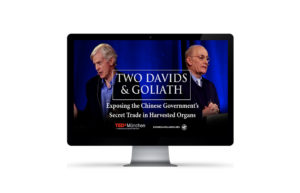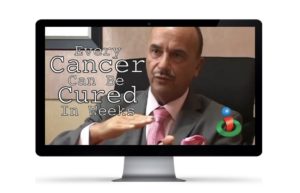Wait until you read this. My inbox this week has continued to flood with all manner of articles about the corona virus story, and a big thank you to all of you sending me articles about it (and to those of you also, who have been sending articles about other stories as well). But among these there’s a story that …well… really takes the cake.
But first, do you remember “weather derivatives”? I’ve previously touched upon this subject in various blogs, and the essence of my remarks has always been that “weather derivatives”, as “financial instruments,” are a very handy thing to have around when technology has given “them” the ability to manipulate the weather. It’s one more way for “them” to make freight cars full of money in the ultimate “insider trading” scheme. Or, conversely, it’s a way to set up your financial opponents for a fall: bet that the weather in zone A won’t go as planned, and you can bankrupt your enemies. The bottom line is that “weather derivatives” – in my high octane speculative view at least – are an indicator that “the technology exists.” After all, in dealing with “them” we’re dealing with a group of people that have never seen a market they didn’t try to rig.
Well, “they” have found yet another way to make money on human suffering and misery. First, consider the following story shared by E.G. and many, many others (again, thank you!):
Is Wall Street Behind The Delay In Declaring The Covid-19 Outbreak A “Pandemic”?
Now, if this does not “grab your attention,” I don’t know what will:
In June 2017, the World Bank announced the creation of “specialized bonds” that would be used to fund the previously created Pandemic Emergency Financing Facility (PEF) in the event of an officially-recognized (i.e. WHO-recognized) pandemic.
They were essentially sold under the premise that those who invested in the bonds would lose their money if any of six deadly pandemics hit, including coronavirus. Yet, if a pandemic did not occur before the bonds mature on July 15, 2020, investors would receive what they had originally paid for the bonds back in addition to interest and premium payments on those bonds that they recieve between the date of purchase and the bond’s maturation date.
The PEF, which these pandemic bonds fund, was created by the World Bank “to channel surge funding to developing countries facing the risk of a pandemic” and the creation of these so-called “pandemic bonds” was intended to transfer pandemic risk in low-income countries to global financial markets. According to a World Bank press release on the launch of the bonds, WHO backed the World Bank’s initiative.
However, there is much more to these “pandemic bonds” than meets the eye. For example, PEF has a “unique financing structure [that] combines funding from the bonds issued today with over-the-counter derivatives that transfer pandemic outbreak risk to derivative counterparties.” The World Bank asserted that this structure was used in order “to attract a wider, more diverse set of investors.”
Critics, however, have called the unnecessarily convoluted system “World-Bank-enabled looting” that enriches intermediaries and investors instead of the funds intended targets, in this case low-income countries struggling to fight a pandemic. These critics have asked why not merely give these funds to a body like the Contingency Fund for Emergencies at the World Health Organization (WHO), where the funds could go directly to affected countries in need.
…
Some analysts have argued that these pandemic bonds were never intended to aid low-income pandemic-stricken countries, but instead to enrich Wall Street investors. For instance, American economic forecaster Martin Armstrong has called the World Bank’s pandemic bonds “a giant gamble in the global financial casino” and a “scheme like no other,” recently arguing that these bonds could present a “a structured derivative time bomb” that could upend financial markets if a pandemic is declared by WHO. Armstrong went on to say that it is in WHO’s interest to declare the coronavirus outbreak a pandemic, but noted that, in doing so, they would cause bondholders to take significant losses.
And, just in case you’re wondering if this is actually true or not, V.C. shared this version of the story:
It says pretty much the same thing:
f there is a pandemic, the World Health Organisation gets to keep money and the bondholders lose. You figure out who would be asking for help.
For those who are not part of the conspiracy networks, this is related to the outstanding World Bank Pandemic Bonds which will come due for expiration this July here in 2020. This will be in the neighborhood of $500 million which is perhaps a structured derivative time bomb that most people have never heard of.
These pandemic bonds were sold to investors as a giant gamble in the global financial casino. The World Bank sold “pandemic bonds” which were a scheme like no other. In 2017, these bonds were sold to private investors on the premise that they would lose their money if any of six deadly pandemics hit. They did not pay out in 2019 when the Ebola virus broke out in Africa. The World Bank announced the creation of these structured bonds in May 2016 at the G7 Finance Ministers and Central Governors meeting in Sendai, Japan.
The World Health Organisation will keep the money and will use it to fight the outbreak. Investors bought the bonds and received regular coupon payments in return, which were substantial in this world of negative interest rates. If there is an outbreak of disease turned into a pandemic, then investors don’t get their initial money back. There are two varieties of debt that are scheduled to mature in July 2020.
For those of you who’ve been following the rising chorus of people questioning this or that aspect of the corona virus story, especially those who question the numbers and the narrative, this should be disturbing, because it means, effectively, that whoever controls the media narrative and the institutions making the ex cathedra statement that “it’s a pandemic” gets to make the money. This is especially disturbing given that it’s not entirely certain we’re dealing with “just a virus” at all, but may be dealing with a combination of technologies, for example, virus activated by signals, a kind of bio-electric phenomenon. If it should be declared a pandemic, then a lot of people will lose their money… disease has been financialized as a means of harvesting wealth…
… a convenient thing to have around when you have the technology to create the disease…
…Weather derivatives, meet pandemic bonds; pandemic bonds, meet weather derivatives…
And all of this over an alleged virus that appears not to have a very high mortality rate.
Except in China.
Oh, by the way, there’s another geopolitical wrinkle to the story as well according to this story shared by D.P.:
Russia hasn’t had any new coronavirus cases. Why is that?
Amid all the speculation about the story being about bio-economic warfare against China, you can add that one of its implications might be to undo China’s whole “one belt one road” initiative; with travel restrictions being clamped down, trade will ultimately suffer, and in Russia’s case, new sources of financing and technology for its own “northern routes” of the silk road will have to be found (think Japan).
So what’s the bottom line? If there is one, I suspect that it’s this: we’re dealing with monsters utterly lacking in any humanity, for financializing disease and plague is simply taking a chapter out of the playbook of the Most Serene Republic of Venice, which “republic” appears not to have died, but merely metastasized.
See you on the flip side…










Leave a Comment
You must be logged in to post a comment.